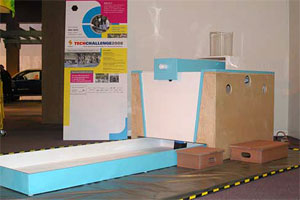Guest blogger Lisa Croel of The Tech Museum in San Jose, CA sits in for Dr. Barry Starr this week.

I remember loving science class as a kid. The paper-maché messes, the bubbling baking soda, all of the wonderful experiments... I loved it all. Now, many grammar school kids are lucky to get 15 minutes of science education a week. Hardly enough time to get them imagining future careers as scientists, engineers and inventors.
Between the lack of time given to science education, and the structure imposed by curriculum standards, museums need to be part of the education equation. My boss has a saying: "Give random a chance." I love this quote because it speaks to the role informal educational resources like science museums need to be playing. By exposing young people to the experiences and programs in a museum, who knows what might really resonate and inspire?
For over 20 years, The Tech's Tech Challenge program has presented kids with an open-ended problem for which there is no one right answer. It forces participants to use their knowledge and ingenuity to solve the problem. For example, this year the Challenge (called Water Works) is all about moving water from a stream up to a village without electricity. There is no one right answer, and there are lots of ways to solve this problem.
Participants are 5th to 12th graders who will work in teams of 2-6 to explore solutions to solving this real world problem. Along the way, they will hit some roadblocks and come up with some duds. And that's OK because it is here that kids will learn that failure is an important part of problem solving. We have a great quote etched into a wall on the outside of The Tech from Intel co-founder and philanthropist Gordon Moore that says, "If everything you try works, you are not trying hard enough." Through failure, many of the Tech Challenge teams will come up with a far superior solution.
